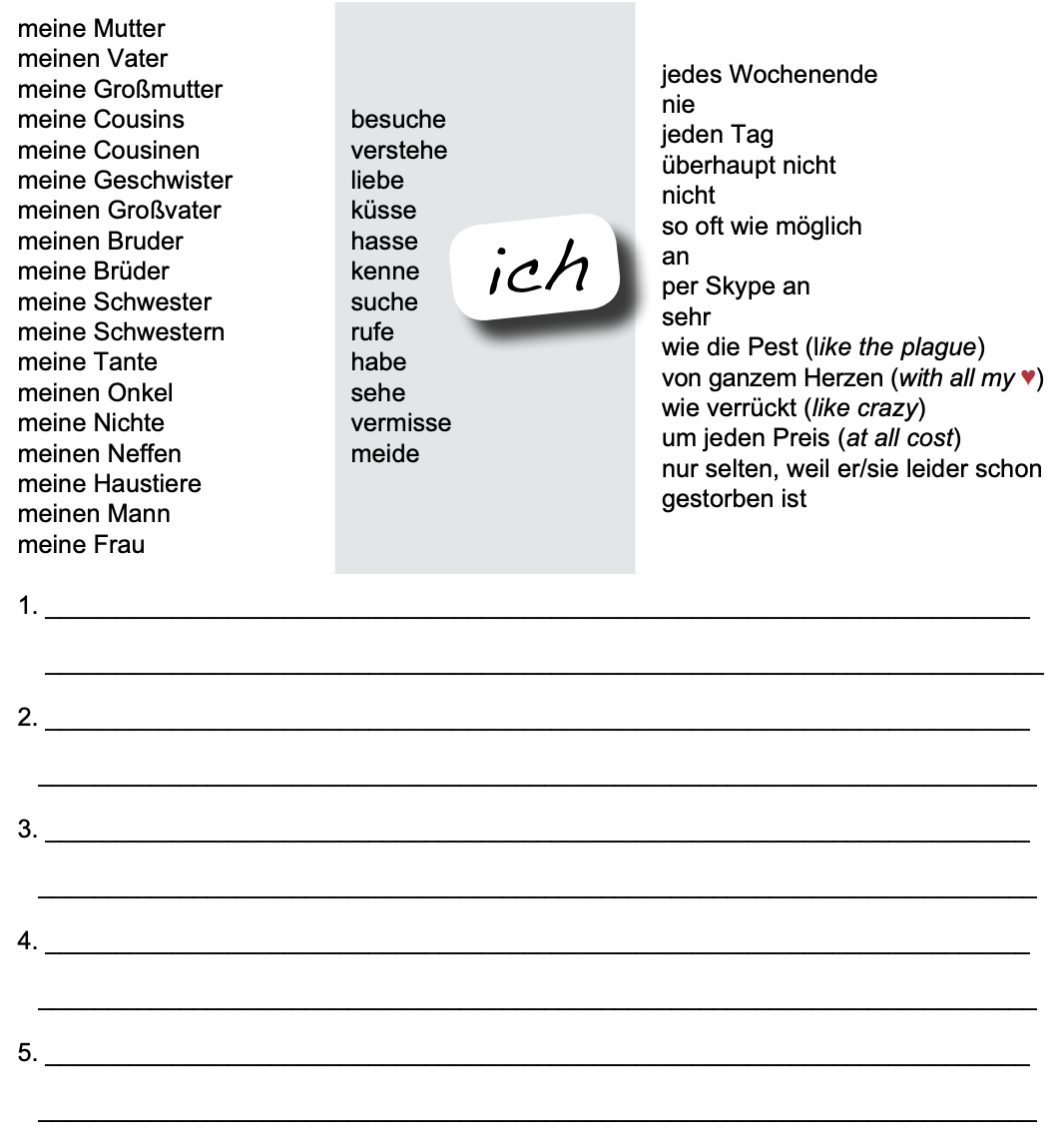5.2: Die Familie
- Page ID
- 113496
Aktivität 1. Die Familie
What feelings, activities and ideas do you associate with die Familie? Jot down as many words as you know in German, then feel free to add to the list in English.
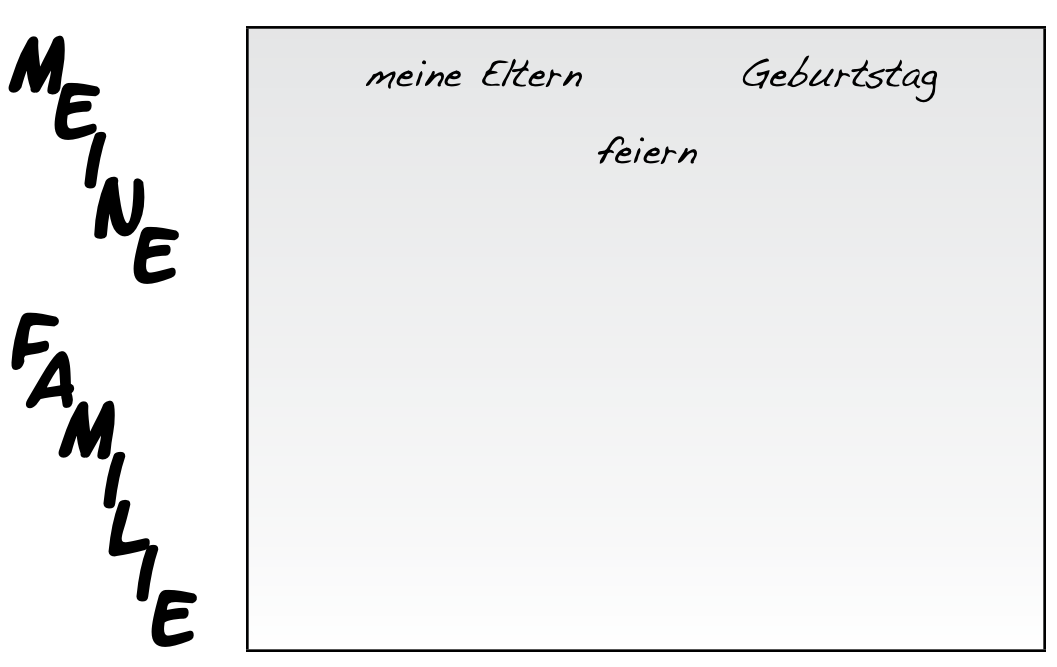
Aktivität 2. Wen gibt es in deiner Familie?
Listen to Berna and Jan’s video clips titled „Wer ist in deiner Familie?“ and circle the correct information based on what Berna and Jan say; each sentence may have more than one correct answer!
Berna hat eine kleine • große • normale Familie.
Sie hat
eine Mutter • einen Vater • zwei Schwestern • zwei Geschwister.
Ali und
Nur sind Bernas Eltern • Bernas Kinder • Bernas Schwester und Bruder
Bernas Geschwister
leben immer noch zu Hause.
studieren an der Uni in Kiel.
studieren in der Türkei.
sind jünger als Berna.
Jan hat eine kleine • große • normale Familie.
Er hat eine Mutter • einen Vater • einen Bruder • drei Brüder.
Niels ist 3 Jahre jünger als Jan • 30 Jahre alt • 3 Jahre alt.
Jans Großeltern • Großväter • Großmütter sind gestorben.
Jan hat auch noch eine Tante • einen Cousin • eine Katze.
Aktivität 3. Die amerikanischen Studenten: Wer ist in deiner Familie?
Watch the video clips with the American students and write down the information you hear about their families: names of their parents, ages and names of their siblings and any other interesting details they say about their Familienmitglieder (family members).Watch the video clips with the American students and write down the information you hear about their families: names of their parents, ages and names of their siblings and any other interesting details they say about their Familienmitglieder (family members).
| Adan | Hassan | Erin | Sara | Sophia | |
| Eltern (Ihr Name, Alter zum Beispiel) | |||||
| Geschwister (Name, Alter zum Beispiel) | |||||
| Andere interessante Details |
Aktivität 4. Eva und Peter: Meine Familie
Watch Eva and Peter’s video clips („Wer ist in deiner Familie?”) and complete the description of their families using the words provided in the box above the texts (each word may be used more than once, as reality requires). Afterwards, answer the two sets of questions regarding families: the first set about Eva and Peter’s notions of family, then about yours!
Bruder • Brüder • Eltern • Familie • Frau • Kinder Mutter • Neffen • Nichten • Omas • Opas • Schwester Söhne • Tante • Vater
A. Evas Familie
Eva hat ______________________ und ______________________ und _______________________. Ihre _______________________ leben weiter weg, und ihre __________________________ sind leider schon gestorben. Ihr Vater hat __________________________, die zwei __________________________. Mütterlicherseits (on her mother’s side) hat sie auch einige _____________________ und ________________________, die Kinder von ihrer __________________________.Eva hat ______________________ und ______________________ und _______________________. Ihre _______________________ leben weiter weg, und ihre __________________________ sind leider schon gestorben. Ihr Vater hat __________________________, die zwei __________________________. Mütterlicherseits (on her mother’s side) hat sie auch einige _____________________ und ________________________, die Kinder von ihrer __________________________.
B. Peters Familie
Peter meint, er hat eine ziemlich große __________________________. Seine ______________________ leben immer noch in der Schweiz und er hat auch zwei _______________________ mit Familie. Ein ____________________ ist vier Jahre älter als Peter, der andere _______________________ ist Pilot und ist 10 Jahre jünger als Peter. Er hat auch eine Familie in Amerika: eine _________________________ und vier __________________________. Ein __________________________ wohnt in Colorado, die anderen drei immer noch in Austin.
C. Genauer zuhören
Watch Eva and Peter’s video clips again, and listen carefully to the expressions they use to describe their families.
1. Auf die Frage „Ist deine Familie groß?“ antwortet Eva mit „Jein“. Was bedeutet „Jein“?
2. Aus welchen Familienmitgliedern besteht ihre Familie „im engeren Sinne“? Was heißt „im engeren Sinne“? Wie nennt man diese „Familie“ in Ihrer Sprache? Gibt es dafür einen Ausdruck?
3. Sie meint, dass ihre Familie ein bisschen weiter weg wohnt. Was heißt „weit weg“ aus Evas Perspektive?
4. Peters Antwort auf die Frage „Haben Sie eine große Familie?“ ist:„Es geht.“ Was bedeutet diese Antwort?
5. Wie oft fährt er in die Schweiz, um seine Familie zu besuchen? Meinen Sie, dass die Familie für Peter sehr wichtig ist?
D. Wie ist es bei Ihnen?
Reflecting back on the answers given by the native speakers and the American students to the questions thus far, answer the following questions based on your family. Is your family similar to or different from the families of the previous respondents?
1. Was ist eine große, kleine, „normale“ Familie in Ihrem Land?
2. Wer ist „Familie“ und wer sind „Verwandte“ in Ihrer Kultur?
3. Wie weit weg wohnt Ihre Familie von anderen Familienmitgliedern?
4. Wie oft besuchen Sie Ihre Familie und Verwandten?
Aktivität 5. Jetzt sind Sie dran!
With your classmates (or other learners), find people who match the following descriptions and write their names in the spaces provided. Of course, you will have to rephrase the statements to questions.
A. Fragen stellen
How do you ask in order to get an answer for the statements in the boxes below? Generate the questions you need to ask!
1. Hast du eine große Familie?
2.
3.
4.
5.
6.
7.
8.
9.
10.
11.
12.
B. Finden Sie jemanden, der ...
| eine groβe Familie hat. | mehr als drei Geschwister hat. | einen älteren Bruder hat. | eine jüngere Schwester hat. |
| keine Tanten hat. | ein Einzelkind ist. | einen Zwillingsbruder/eine Zwillingsschwester hat. | glaubt, dass Haustiere Familienmitglieder sind. |
| verheiratet ist. | einen Onkel hat. | mit seinen Eltern gut auskommt. | eine Urgroßoma hat. |
Aktivität 6. Zurück nach Hause
Watch Berna and Jan’s video clips („Zurück nach Hause”) and find out how often they travel home to see their families, and how they stay in touch from afar. Answer the questions below in as much detail as possible.
in Kontakt bleiben • anderthalb (1.5) der Besuch • verbracht • herumgefahren das Heimweh • zu Weihnachten • besuche den Touristen/Amerikaner spielen
Wie oft reist Berna zurück nach Deutschland? Wie oft reist Jan zurück nach Hause? Bleibt sie die ganze Zeit bei ihrer Familie? Verbringt er die ganze Zeit bei seiner Familie? Was haben er und seine Eltern gemacht, als sie ihn das letzte Mal besucht haben? Wie bleibt Jan in Kontakt mit seiner Familie?
Aktivität 7. Welche Mitglieder hat Ihre Familie?
Interview three classmates about their families and take notes about their siblings, parents, contact with their grandparents, etc. Are their answers similar to yours?
| Name | |||
| Wie viele Geschwister hat er/ sie? | |||
| Wo wohnen seine/ ihre Eltern? | |||
| Wie oft besucht er/sie seine/ihre Großeltern jedes Jahr? | |||
| Hat er/sie regelmäßigen (regular) Kontakt zu seinen/ihren Cousins/Cousinen? | |||
| Hat er/sie eine Nichte oder einen Neffen? | |||
| Welche Sprachen spricht er/sie in der Familie? |
Aktivität 8. Referat: Meine Familie
Review the video clips you have seen so far in Kapitel 5 and take notes on the questions that were asked. Select five questions that help you describe your family and answer them. If you feel that your family is too private to discuss – or if you want extra practice – feel free to „make up“ or „adopt“ a family: borrow somebody else’s family life, such as The Simpsons (a huge hit in Germany!) or Brangelina or The Smurfs, or the British Royal Family. Bring pictures to class, and tell your peers about your family.
Beispiel: Hast du eine große Familie?
Meine Fragen:
__________________________ ?
__________________________ ?
__________________________ ?
__________________________ ?
__________________________ ?
Meine Familie:
__________________________
__________________________
__________________________
__________________________
__________________________
Aktivität 9. Der Stammbaum: Die Gebrüder Grimm
Fill in the family tree of the Brothers Grimm below. What was the relationship between the family members? The point of reference is the older brother, Jakob Grimm. Since his relatives (at least the ones listed below) are all dead, you need to use war (was) or waren (were) to talk about them.
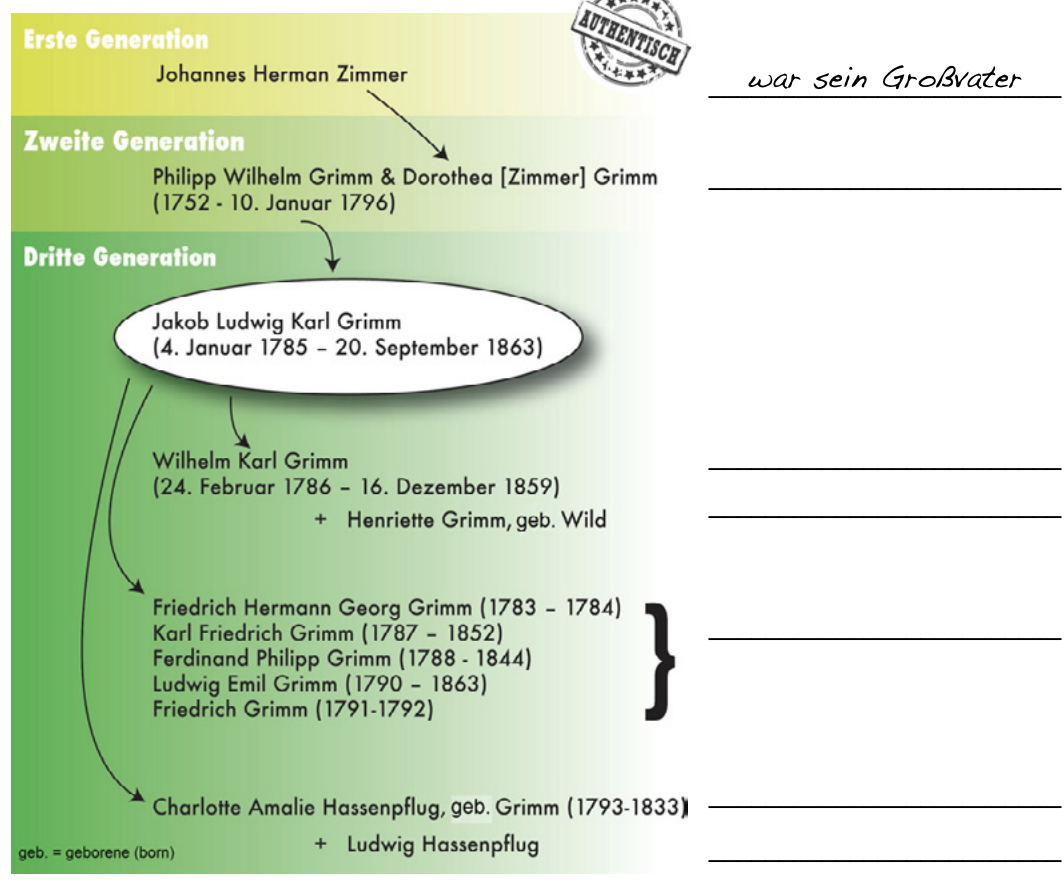
Aktivität 10. Die Gebrüder Grimm und Sie
Describe the relationships between Jakob Grimm and his family members, then describe the same relatives in your family.
Beispiel: Johannes Zimmer war sein Großvater. ➘ Mein Großvater heißt Bruno Zwietasch.
| Seine Familie | Meine Familie/Meine Verwandten |
| Philipp Grimm war sein Vater. | Mein Vater heißt ... |
| Dorothea Grimm war_____________________. | |
| Wilhelm Grimm war______________________. | |
| Henriette war___________________________. | |
| Friedrich, Karl und Ludwig waren ___________. | |
| Charlotte war___________________________. |
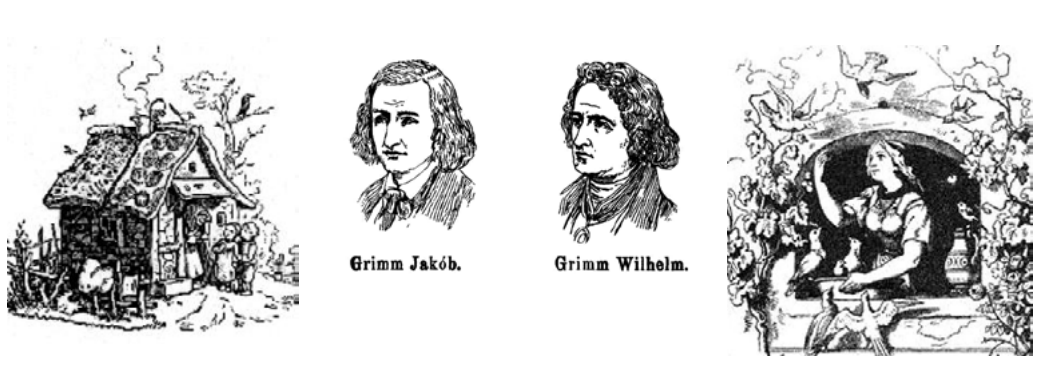
Aktivität 11. Grimmige Familien
In Grimm Grammar, you have met many a family, some not as “traditional” as others. Can you describe the relationships between the following (groups of) individuals?
A. Wer ist wer?
Describe the relationships among the various Grimm characters and replace the underlined words with the appropriate personal pronouns in the nominative case. Specifically, describe how the person on the left of the slash is related to the person on the right of it.
Beispiel: Rotkäppchen — die Großmutter Rotkäppchen ist ihr Enkelkind.
Aschenputtels Stiefmutter — Aschenputtels Vater Die Stiefmutter ist seine Frau.
1. die böse Königin — Schneewittchen
2. Rotkäppchen — die Mutter
3. Hänsel — Gretel
4. Schneewittchen — der Königssohn
5. sechs Zwerge — Happy
6. Aschenputtel — die Stiefschwestern
7. der Froschkönig — die Prinzessin
8. die Großmutter — der Jäger (?)
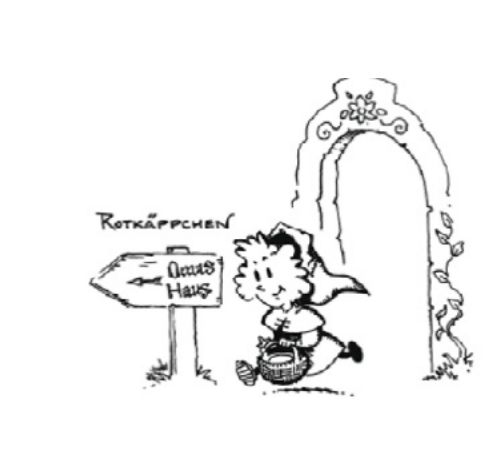
B. Wer tut was?
Complete the sentences with the correct substitution for the underlined people (and animal).
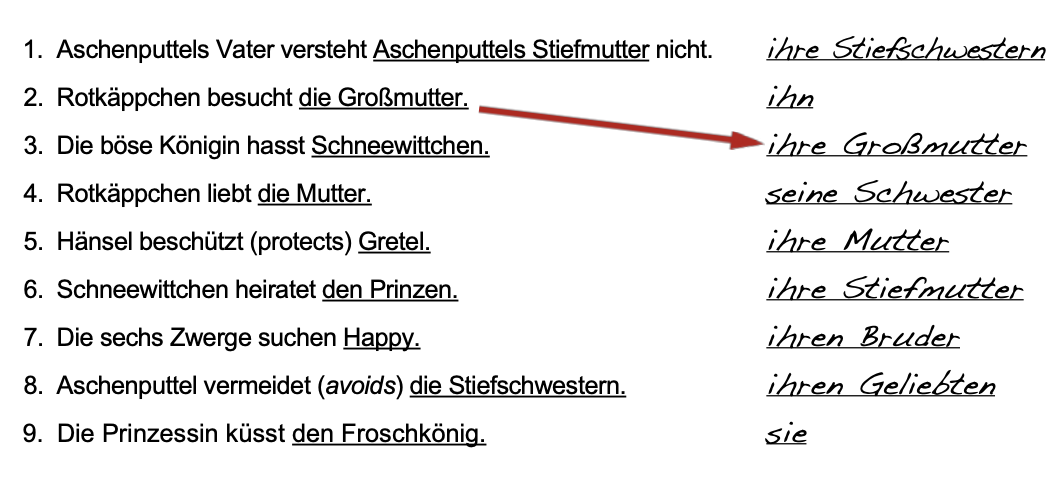
Achtung! Obwohl Achenputtel und Schnewwitchen eigentlich grammatikalisch Neutrum (“das”) sind, benutzt man die Possessivpronomen oft in Referenz zum biologischen Geschlecht der Person, also hier weiblich.
Aktivität 12. Und Sie?
What do you do with your family? Love, visit, avoid, protect, kiss? Do tell all ...
A. Mein Stammbaum
On a separate sheet of paper, draw and label a family tree (Stammbaum) of your real (or imaginary) family.
B. Meine Familie und anderes Getier ...
(“My family and other animals” à la Gerald Durrell). Select 4-5 members of your family (immediate, extended and imaginary members qualify) and describe them with interesting details. Ask yourself: would you want to read about the detail? If yes, it’s interesting. If not, it’s boring, choose something else ☺. Feel free to borrow a relative from the first, a verb from the second and at least one other detail from the third column, but you are very much encouraged to expand beyond these options.
Note that ich is the subject, and all nouns in box 1 are the direct objects (accusative) of a sentence. In other words, you will start the sentence with the direct object, follow that with the conjugated verb, then add additional information to the sentence to spice things up. Channel Master Yoda: ”My parents miss I very much …”
Beispiel: Meine Tante sehe ich jedes Wochenende; sie heißt Anika, so wie meine Großmutter. Meinen Onkel David verstehe ich überhaupt nicht. Er kriegt jedes Jahr einen Strafzettel, weil er mit seinem BMW zu schnell fährt.
